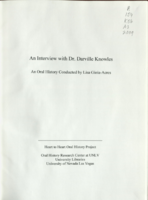Search the Special Collections and Archives Portal
Search Results

Transcript of interview with Paul Huffey and Michael Mack by Claytee White, February 2, 2010
Date
Archival Collection
Description
Whenever Paul Huffey drives through John S. Park Neighborhood he visualizes his youth and the times he spent with his childhood friend Michael Mack, who joined in this interview. Together they reminisced about their teen years in the 1950s and living in John S. Park Neighborhood. Paul's first home was Normandie Court, the first authentic motel in Las Vegas. In 1947, Paul's father purchased a lot on Paseo Park and built a home for his wife and only child. He describes life in that home as idyllic: no war or unemployment issues, a time when the Strip was "meaningless" unless you had a parent working there. An era when mothers, at least in his neighborhood, were stay-at-home moms and children freely roamed on their bicycles. Of their teen years, Paul and Michael recall their hi-jinks, discovering beer, and admiring pretty girls. In 1956, he graduated from Las Vegas High School, enlisted in the U. S. Army Reserve and enrolled in University of Nevada Reno. He taught history at Basic High School in Henderson for nine years.
Text

Transcript of interview with Maxine James by Danny DiGiacomo, March 2, 1977
Date
Archival Collection
Description
On March 2, 1977, Danny DiGiacomo interviewed office manager, Maxine James (born September 6th, 1925, in Hayti, Missouri) about her life in Southern Nevada. The two discuss the ease with which people could find jobs in early Las Vegas. The interview provides an overview of James’ occupational history in Las Vegas and concludes with a discussion on the rapid growth of the city in the fifties and sixties.
Text

Patricia Lappin interview, February 26, 1980: transcript
Date
Archival Collection
Description
From the Ralph Roske Oral History Project on Early Las Vegas collection OH-01063. On February 26, 1980, Nancy Bright interviewed school teacher, Patricia Lappin (born April 14th, 1924 in Denver, Colorado) at Robert L. Taylor Elementary School in Henderson, Nevada. The interview covers Boulder City, Nevada around Hoover Dam. The two discuss the different gambling habits between Southern Nevada locals and Las Vegas tourists. During the latter half of the interview, the two speak at length about the impact of nuclear waste on Nevada. Lappin explains the unique issues that Southern Nevada faces as one of three states to accept nuclear waste.
Text

Transcript of interview with Phyllis Webb Clark by Lorna Suzette Clark, April 7, 1976
Date
Archival Collection
Description
On April 7, 1976, Lorna Suzette Clark interviewed her mother-in-law, Phyllis Webb Clark (born 1928 in Los Angeles, California) about her experiences from living in Las Vegas. The two first discuss education, the various address at which Phyllis lived, and the early development of the Strip and Downtown areas. The interview then covers the visits of important individuals, forms of transportation, the effect of World War II on the economy, and the effects of the growing town on hospitality and courteousness. Phyllis also mentions the Helldorado Parade, her involvement in Boy Scouts and Girl Scouts, and recreational activities. The interview concludes with a discussion on the atomic testing, the Stewart Ranch, and floods in Las Vegas.
Text

Transcript of interview with Ruth and Jake Dieleman by James M. Greene, November 15, 1974
Date
Archival Collection
Description
On November 15, 1974, James M. Greene interviewed Ruth Dieleman (born 1908 in Searchlight, Nevada) and her husband Jake Dieleman (born 1904 in Axel, Netherlands) about their lives in Southern Nevada. Ruth first talks about her life in Searchlight while growing up, her experience as an educator, and her various residences in Southern Nevada. Jake first talks about his immigration into the United States and his eventual move to Nevada to get into construction rigging for the building of Hoover Dam. He discusses his work as a rigger in detail but also discusses his work on various Las Vegas casinos as well as his work in the state legislature.
Text

Transcript of interview with Dr. Darville Knowles by Lisa Gioia-Acres, October 9, 2008 and November 9, 2008
Date
Archival Collection
Description
Dr. Darville Knowles was born in Miami, Florida, in 1948. His mother and father were schoolteachers in Dade County. After their divorce in 1962, Darville's mother relocated to Las Vegas with her two sons and took a teaching position here. Dr. Knowles comments on the differences between Miami and Las Vegas as far as segregation regarding housing, education, and job opportunities. He also mentions that his grandmother had emigrated from the Bahamas and that she impressed on them to make their own situation and community better. He recalls that track and field athletics were desegregated before the contact sports, such as football and basketball. Darville and his brother Michael (a lawyer in Miami) both graduated from college. Darville attended Howard University and Stanford University Medical School and completed his internship at the Jewish Hospital of St. Louis. Dan Wilkes, a family friend and pathologist in Las Vegas, convinced Darville to look at Las Vegas for job opportunities. After trying St. Louis, Atlanta, Houston, and Los Angeles, Dr. Knowles finally settled in Las Vegas in 1982 and "grew' his practice at Sunrise Hospital. Dr. Knowles comments on health problems in Las Vegas related to eating choices, lack of exercise, and poor air quality. He describes how HMOs have changed the practice of medicine and gives his opinions on how health care should be addressed by Congress. He also discusses the future of medicine, the research he was involved in, and the AIDS crisis. Dr. Knowles talks about how medicine has changed since 1982, the large number of respiratory problems that he treats, and comments further on HMOs and the fixture of medicine in Las Vegas. He also shares that he found time to author a murder mystery and has plans to write more.
Text

Transcript of interview with Jackie MacFarlane by Claytee White, February 4, 2010
Date
Archival Collection
Description
Jacqueline "Jackie" Tilman MacFarlane was born in her grandmother's Las Vegas home at H Street and Clark Ave. Her father John Franklin Tilman was a construction worker at Boulder Dam (now Hoover) in early 1930s. Jackie recalls her family having to move several times the Great Depression and living in rural Nevada. Eventually the family came back to reside in Las Vegas. After graduating from high school, she took a waitress job at the Spot Cafe (Main & Charleston) and then at the Askew Drive-In. It was there that she met her future husband, David MacFarlane, an Air Force cadet. David continued to work at Nellis Air force Base as a civilian until he retired in 1987. Jackie describes raising her children in Fair Circle neighborhood during the 1950s and 1960s; a time when Las Vegas was just a "small town of 50,000." She felt safe and always found work in the casinos. Her work career included being a change girl at the Mint of Fremont St. and working as the front office cashier at the Desert Inn and then working at the Sands Hotel and Casino. Eventually she became a night auditor at Sands Hotel and Casino and then at Sahara Hotel and Casino from 1970-1977. She remembers working nightshift, coming home to get the kids and husband off to school and work. After leaving Sahara, she began selling Vanda cosmetics as a home business, something she still does today.
Text

Transcript of interview with Don Ross by Barbara Tabach, February 15, 2017
Date
Archival Collection
Description
At the time of this interview, Don Ross has devoted nearly four inspirational decades of his life in the hotel and hospitality industry. In December 1987, at the age of 29, he accepted a position with Caesars and is now the Vice President of Catering, Conventions & Events for Caesars Palace Las Vegas. Don shares personal stories that lead to his “Don-mode” of providing a high level of customer service. From experiences with his grandparents to an extraordinary upbringing in his parents’ business, Green Chimneys, in Brewster, New York, Don received a surprisingly well-rounded educational foundation. As Don discovered his natural innate ability to serve others in the hospitality industry, he thrived and has never looked back. In recent years, his leadership talents and giving nature have been honored. In 2009, he was one of three distinguished industry executives recognized for their exceptional contributions to the hospitality industry as an “Industry Executive of the Year” during UNLV Harrah College of Hotel Administration’s 5th Annual Vallen Dinner of Distinction. Over the years, he has been honored for his work with Opportunity Village, his Jewish community involvement, and his continued work with Green Chimneys among many other organizations and causes.
Text

Transcript of interview with Ron M. Portaro by Stefani Evans and Claytee D. White, July 27, 2017
Date
Archival Collection
Description
Most Las Vegas residents like living in Southern Nevada, but few make the leap of faith that Ron M. Portaro did in 1994. The business and development consultant gave up a "tenure-track, full time, full-benefits, kids-could-go-to-college-for free job" to keep his family in Las Vegas. He had no local job, so he commuted twice a month to the Cleveland and Toledo areas for two years to complete the consulting assignments that fed his young family. As the Ohio native discusses the dysfunctional family into which he was born and was raised, he also talks about forging his own path as an overachiever, about going to college at Penn State at Altoona on a mining engineering co-op program with Morton Salt, working six months out of the year in the salt mines and attending classes the other six months. After transferring to the University of Toledo, he formed his own painting business to pay his tuition and graduated in management in 1978 and earned his JD and MBA in 1981. His mentor at University of Toledo asked him to teach labor management. While teaching labor relations he also began representing athletes as a player agent in the National Football League and the United States Football League back in the day and the Canadian Football League. From there, he became associate director for the Northwest Ohio Center for Labor Management Cooperation at the University of Toledo and later with the Cleveland State Labor Management Center. It was with the latter that he learned the benefits of the BUILT-RITE model of business relations to promote cooperation between and among the building trades, contractors, and owners. In this interview, Portaro speaks to the BUILT-RITE model for cooperation, his 1993 move to Las Vegas and fortuitous meetings of Pastor Paul Goulet of the International Church of Las Vegas, City of Las Vegas councilman Arnie Adamsen, and Charlie Kajkowski of the Las Vegas Public Works Department. He reveals how these connections eventually not only shaped Portaro's life in Southern Nevada; they also enabled him to turn his life experiences, education, and skill set to benefit his church, his family, and his adopted community. The commitment Portaro made in 1994 to remain in Las Vegas has benefitted Southern Nevada tourists, residents, and business owners in countless ways we can appreciate only when we stop to think about how many people had to cooperate and communicate to make our large infrastructure projects come to fruition.
Text

Transcript of interview with Norma and Gil Schwartz by Stefani Evans, September 22, 2017, October 4, 2017, & February 14, 2018
Date
Archival Collection
Description
It's been live, love, and laugh ever since we met. We've been married now thirty-three years. Even for a ninety-three-year-old man, thirty-three years is a long time. For Gil Schwartz, thirty-three years is nearly one-third of his life. The former real estate broker, who was raised in Rye, New York, learned the business by working with his father and then forming his own property management company in Manhattan. In 1959, with two children in tow, Gil moved to Las Vegas, where he soon took temporary quarters at Twin Lakes Lodge and he and his children learned to ride horses. In this interview, Schwartz recalls how horseback riding gave him an instant network of friends through working on the annual Helldorado Days and joining the Sheriff's Mounted Posse. He talks about Sahara Realty, the real estate brokerage he founded in 1964 and sold in 1983, and he shares his experiences 1967–68 in negotiating options to buy about one hundred parcels of unimproved land for Herb Nall, who represe
Text
